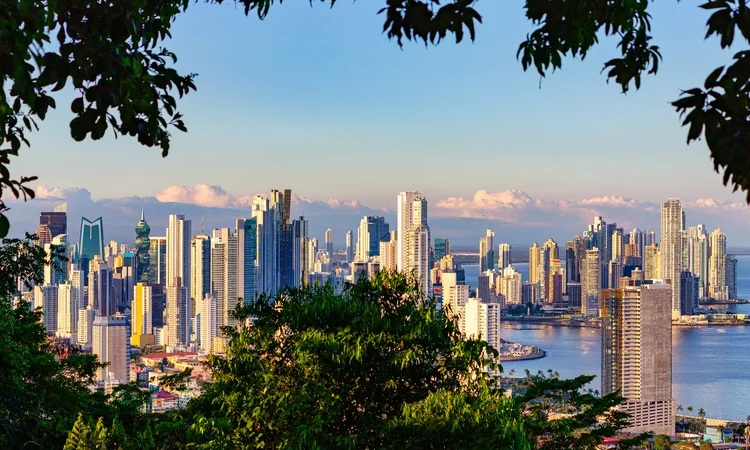
Top 5 Investments In Panama
Greetings from our annual Live And Invest In Panama Conference.
Lief is busy emceeing right now, so your missive today comes from me (Kathleen)…
I thought I’d just fill you in on exactly why we keep returning, again and again, to host this annual conference in (and about) the “Hub of the Americas”…
(And by the way, you’re not too late to gain virtual access to the conference—plus recordings of the whole event, including proceedings you may have missed.
It’s also one of the world’s safest investment havens. This despite the fact that a downturn in Panama’s property markets has been predicted for years.
Panama is Lief’s and my part-time home base and our full-time business HQ. I can tell you from that boots-on-the-ground perspective that, like Mr. Twain’s demise, those rumors of Panama’s softening investment climate are greatly exaggerated.
Starting in 2003 and continuing through 2008, this country enjoyed a mega construction boom. Then came the crash of real estate markets around the globe. Would-be investors worried about the unfinished projects in Panama at the time, especially in Panama City.
Panama developers were forced to adjust. No longer able to sell at frothy pre-2008 prices, they retreated to “what the market would pay.” What they found was that, while their profit margins were constricted, they were still able to turn over inventory.
Most affected was the top end of the market. The highest-priced projects in 2008 suffered the biggest reductions in pricing, of course. Some buildings underway were delayed. Others in planning stages didn’t get off the ground. However, the market in general carried on. Values fell 25% on average.
Markets elsewhere around the world fell by 50% and more. Meantime, in Panama City, rental rates remained strong for those who were able to take possession of their apartments, and prices recovered quickly across the capital city.
Why was Panama’s drop less precipitous than in other markets? And why did the country recover more quickly than nearly any other?
The Panama Canal!
It’s a cash cow.
The critical global trade route generates nearly four billion dollars a year. That’s a lot of per-capita cashflow in a country of four million people.
The Canal makes Panama the ultimate safe haven.
That was true in 1998 when I traveled to Panama for the first time… and it’s more true right now than ever.
In fact, even though traffic through the Panama Canal was down in 2023 due to short-term drought… profits were up.
The canal remains vital for global trade—and a bulwark for Panama’s economy. And that impacts real estate values too. Today this marketplace is far more niched than you might expect.
Panama City, for example, like any city of a million-and-a-half people, is many different markets, some offering more potential and upside than others. In 1998 and through 2008, you could have bought almost anything in Panama and felt confident that you’d make money. That’s no longer the case. Today you need to target your investment search.
Where, specifically, should you be shopping in 2024?
Here are our five top picks:
Top Panama Market #1: Avenida Balboa
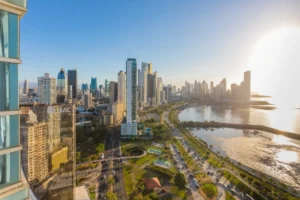
Avenida Balboa, where Lief and I made our first property investment in this country 20 years ago, continues to offer opportunity.
This frontline strip along the Bay of Panama has always been and will always be one of the city’s best addresses.
Pricing continues up even as new buildings and more inventory continue to appear along this oceanside boulevard.
An apartment on Avenida Balboa will always find a buyer or a renter, as the case may be.
Go Offshore Today
Sign up to our free twice a week dispatch Offshore Living Letter
and immediately receive our FREE research report
on how to live tax-free today, while earning up to $215,200!
Top Panama Market #2: Costa Del Este
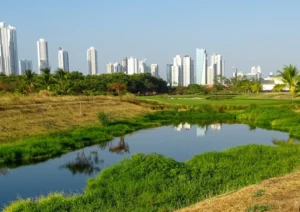
The other area in the city offering strong investment potential is Costa del Este. This master-planned suburb is the focus of many top Panama developers who are hard at work building both houses and apartment towers, as well as commercial space.
In addition, this is also the area where many (most) of the many thousands of expat workers moving to Panama City for jobs with the dozens of international companies that have set up and continue to be set up in and around Panama’s capital are looking to live… especially if they are coming with families.
Prices in Costa del Este are among the highest in the city, but demand remains strong. Buying pre-construction either to sell or to rent at completion can be an effective and profitable strategy.
Top Panama Market #3: Veracruz
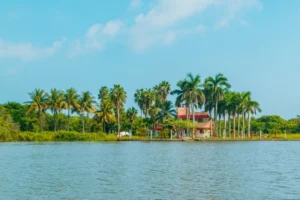
Outside the city, other dynamics are playing out and creating opportunity.
Thanks to the anticipated new (fourth) bridge over the Canal, the Veracruz neighborhood, which sits on the coast behind Panama Pacifico, is smack-dab in the path of progress.
This is one of my favorite up-and-coming zones for a rental investment. It’s the nearest beach area to the city but has traditionally been overlooked by both tourists and investors.
Top Panama Market #4: Veraguas
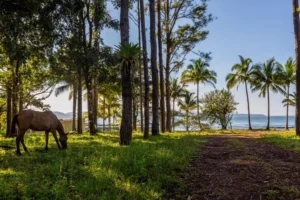
When Lief and I decided we were all in on Panama, we went in search of a legacy-level property play.
We focused our scouting on the western side of Panama’s Azuero Peninsula.
Its Pacific coast is one of Panama’s greatest assets. Everyone who can afford a house at the beach has one.
By 2008, when we launched our search, beachfront nearer to Panama City was already being aggressively developed and the eastern coast of the Azuero Peninsula was in the crosshairs of international investment groups.
Azuero’s western coast, in Panama’s Veraguas Province, was a final frontier.
Access was more difficult, but prices were one-third as much for land we found to be arrestingly more beautiful. Plus the sunsets along this coast are the best in the country.
For my money, this Veraguas coast continues to hide the greatest opportunities this country has to offer.
Top Panama Market #5: Puerto Armuelles
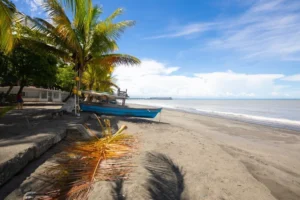
The final growth market I want to highlight for you today is Puerto Armuelles.
Puerto Armuelles found its place on the map in 1927 when Chiquita Banana came calling.
The company built the town as it exists today, complete with housing for workers, roads, sewers, and a railroad. Puerto’s infrastructure is head and shoulders above what you typically expect from a small Central American town.
Chiquita is no longer headquartered here, but its legacy carries on.
When Chiquita pulled out of this coastal region in 2003, the local economy collapsed and the population decamped. This is a depressed market that is attracting the eye of forward-looking developers who recognize potential when they see it.




